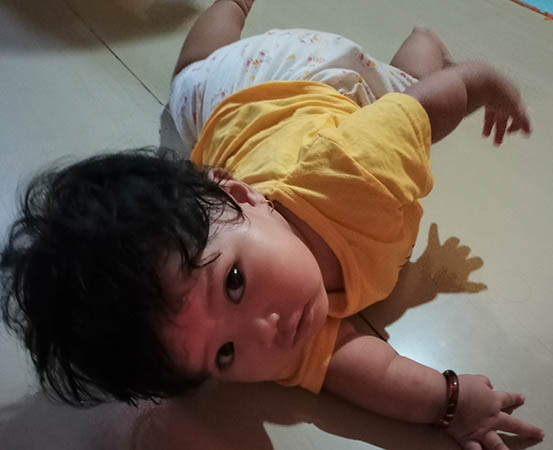
Children often face accidental falls. Fall is natural at any developmental stage of a child, and this is how a child learns to crawl, walk, or run. However, some falls can seriously risk a head injury in children. So parents must get a medical examination for their child.
It was a wave of guilt trip for the 28-year-old new mom with the ushering of the new year in 2024. A sleepless and exhausted Nandini B, a software engineer from Bangalore had just breastfed her baby and presumed the baby was fast asleep. A sleepy Nandini dozed off for a nanosecond and woke up to a thud sound. The one-month-old had suddenly pushed her head back and hit herself on the armrest. A panicked mother immediately checked her baby’s head for any swelling or injury, but there was none. Fearing a head injury, Nandini rushed to the hospital. “Thankfully, the doctors said there was no injury. She was cranky and crying the whole day but got calm by night.”
In another incident, when an eight-year-old girl Rakshita from Bangalore was jumping from her bed, she slipped on the carpet. Within seconds her left eye and the temporal region surrounding the eye got swollen. Her worried grandmother Sunanda P rushed her to a nearby clinic. There was no bleeding, but she had acute pain and swelling. The doctor cautioned that she would require further observation for the next 24 hours, calling it a typical case of head injury and recommended Rakshitha to use an ice pack for the swollen part.
Accidental falls: High risk of head injury in children
Head injuries in children are common, especially under 2 years of age. Toddlers mostly fall from bed or furniture or from caregiver’s arms too.
In a 2018 study from Georgia, US studied pediatric falls between ages 0– 4 and found that emergency visits caused by unintentional falls are common in children below 5 years of age. Also, most children <1 year of age were examined for major or minor head injuries.
“Until the age of 5, children’s heads are larger than the body. In most cases of an accidental fall, the heavier part of the body (the head) touches the ground first,” says Dr Manjiri Somashekhar, lead and senior consultant, Pediatric Surgery, Aster Women and Children Hospital, Whitefield, Bengaluru.
“Apart from toddlers, teenagers are also at risk of head injury due to accidental falls,” points out Dr Tejal Shetty, consultant, Centre for Child Health, Nanavati Max Super Speciality Hospital, Mumbai. The most common causes of head injury in teenagers are bicycle or skateboard adventures, and football, among others.
Head injury possible even without external bruises
Falls leading to head injury and its consequences are a matter of huge parental concern.
Any accidental fall is dangerous if the child falls from a height of more than 10 feet, cautions Dr Somashekhar. If the fall is from a shorter height, it can go either way. The child may either have a mild headache temporarily or a minor bruise — this will heal with time. “In some cases, a high impact fall can risk an internal injury — this can happen despite no external injury,” cautions Dr Somashekhar.
Accidental fall: Watch out for these signs
The 48 hours following a fall is crucial. Dr Shetty enumerates the various signs parents must closely observe in their children after a fall:
- Persistent headache and irritability
- Blurred vision or tired eyes, pupil discrepancy or redness in the eye
- Sensitivity to light and noise
- Difficulty in walking or holding objects in hand
- Drowsiness
- Dizziness, balance issues or loss of consciousness
- Vomiting (>3 episodes)
- Bleeding from the nose or ear
- Sudden sweating
- Blurred speech
- Skin paleness
- Forgetfulness or being in a state of shock
- Convulsions
These signs, if not severe, can be resolved temporarily. In Rakshita’s case, the swelling subsided after a day. “The 24 hours following this mishap were anxious moments,” her grandmother told Happiest Health.

What not to do soon after head injury/fall?
Explaining what not to do soon after a fall, Dr Somasegar adds that one must not feed the child, especially with solid food after a sudden fall. Agreeing with him, Dr Shetty adds one must refrain from suddenly lifting the child. “Sudden lifting can risk the legs, vertebra, or abdominal organs,” said Dr Shetty.
Tests after a severe fall
The child who is brought for physical examination, the doctors would recommend a CT scan after 6-8 hours of the fall to assess the impact on the brain along with a local X-ray. In some cases, doctors also recommend an MRI, explains Dr Shetty.
During the 48-hour observation, medical experts would assess the pupillary reflex and breathing rate, adds Dr Somashekhar.
Prevent a head injury
Dr Shetty recommends parents to childproof their homes to prevent such accidents. Teenagers who use skateboards or ride bicycles should always be encouraged to use helmets to prevent head injuries. She adds that it is also important that children learn how to do first aid for sudden concussions.
Takeaways
- Head injury in children under 2 years of age is common.
- Toddlers mostly fall from bed or furniture or sometimes from caregiver’s arms too.
- While not all accidental falls are not serious, parents must observe the child for up to 48 hours.
- Vomiting, bleeding from ears or nose, and sleepiness are among the signs that demand medical examination.

















